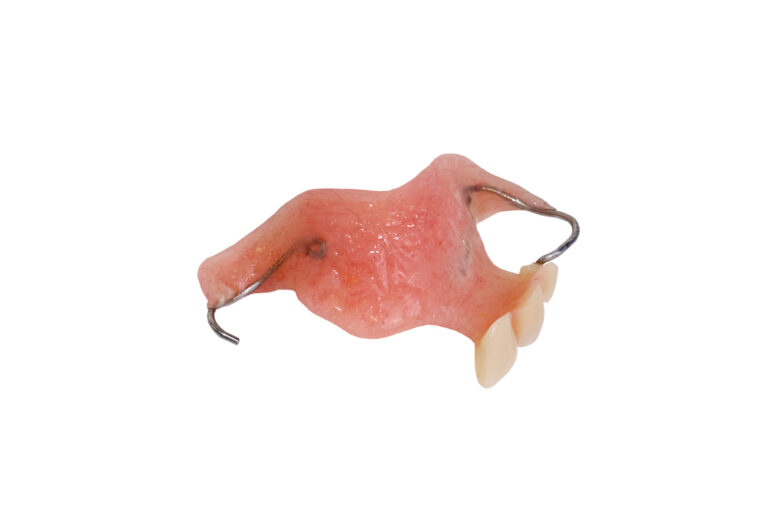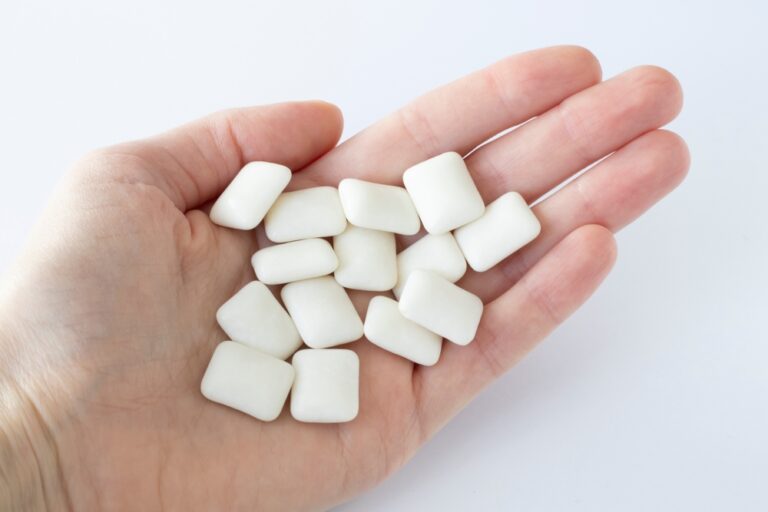What is tooth decay and what causes it?
Tooth decay, also known as dental cavities or dental caries, occurs when acids dissolve the mineralized surface layer of the tooth called enamel. Enamel protects the sensitive dentin layer underneath. When enamel erodes, holes or pits called cavities develop in the teeth. These can range from mild to deep, eventually forming all the way down to the inner pulp layer if not treated.
Tooth decay is caused by acids attacking and demineralizing the enamel. These acids are produced when oral bacteria, especially Streptococcus mutans, metabolize fermentable carbohydrates like sucrose, fructose, and glucose from the diet into acids like lactic acid. The following factors contribute to acid production and enamel erosion:
- Poor oral hygiene - Inadequate brushing and flossing allows plaque, a biofilm coating the teeth, to accumulate. The bacteria living in dental plaque produce acids after eating foods, leading to prolonged acid attacks and progressive dissolution of enamel crystals.
- Frequent snacking/sugary diets - Each time carbohydrates are consumed, bacterial fermentation causes an acid attack on teeth for 20 minutes or longer before saliva can neutralize the pH. Frequent snacking means more acid attacks and favors caries development. Sticky candies and dried fruits adhere to teeth, prolonging the period of low pH.
- Reduced saliva flow - Saliva helps buffer plaque acids and wash away food debris. Certain medications, medical conditions, aging, or radiation therapy can all reduce salivary flow, increasing decay risk.
- Gingivitis - Inflamed gums lead to deeper periodontal pockets where plaque can accumulate, and inflammatory cytokines may enhance acid production.
- Poor enamel formation - Developmental defects in enamel structure, fluorosis, early childhood caries, and genetic factors can increase susceptibility to acid dissolution.
If the enamel loses minerals faster than saliva can remineralize it, net demineralization occurs leading to caries formation. Untreated caries progresses through enamel into dentin, causing tooth sensitivity and eventually painful infection of the pulp.
Can charcoal adsorb toxins and disrupt dental plaque?
Charcoal has risen in popularity as an ingredient in toothpastes and powders due to its potential ability to adsorb toxins and oral bacteria that contribute to dental caries and other oral diseases. But does charcoal actually help remove pathogenic substances from the mouth?
Charcoal may adsorb toxins
The highly porous structure of activated charcoal gives it an extremely high surface area, up to 1500 m2/g. This allows charcoal to adsorb various organic chemicals, toxins, gases, and solutes either through hydrophobic interactions, van der Waals forces, or π-π stacking between aromatic compounds and the charcoal surface.
Laboratory studies show charcoal can adsorb common endocrine disruptors like bisphenol A (BPA) and toxic heavy metals like lead and arsenic that may leech from dental fillings and crowns. Charcoal binds these substances in vitro and reduces their absorption when ingested. It has also been investigated as an antidote for poisonings and drug overdoses.
Charcoal may disrupt dental plaque
Studies find activated charcoal can adsorb common oral pathogens including Streptococcus mutans, Streptococcus sanguinis, Lactobacillus acidophilus and Candida albicans both in vitro and in vivo, likely via electrostatic interactions.
By binding these microbes involved in plaque formation and acid production, charcoal may disrupt biofilm accumulation and integrity. One study found rinsing with a charcoal suspension reduced S. mutans in saliva by nearly 25% after 48 hours compared to a fluoride mouthwash.
However, the pH of charcoal rather than true adsorption may be the main factor reducing oral bacteria. Charcoal creates an alkaline environment unfavorable for acidogenic bacterial growth. Overall, while charcoal shows potential for modest decreases in some oral bacteria, reductions are lower than common antimicrobial mouthwashes containing chlorhexidine or cetylpyridinium chloride.
But the extent of benefits are uncertain
Despite the potential adsorption mechanisms, there is little clinical evidence showing charcoal improves oral health above regular hygiene:
- One study found no difference in gingivitis, plaque, calculus, staining, or gingival bleeding after 6 months using a charcoal dentifrice compared to a fluoride toothpaste.
- A review reported minimal difference in plaque and gingival scores between patients brushing with charcoal-containing vs traditional toothpastes after 4 weeks. Any changes were likely caused by mechanical abrasion rather than true charcoal adsorption.
- Saliva likely reduces charcoal’s ability to adsorb bacteria, viruses, and proteins due to competitive binding. Salivary glycoproteins can block bacterial adhesion sites.
- The small particle size needed for sufficient adsorption also limits penetration into plaque biofilm. Larger charcoal pieces are most readily retained on teeth.
Overall, while charcoal may adsorb some oral toxins and microbes in lab conditions, these effects do not clearly translate to significant clinical improvement in vivo from routine use of charcoal dentifrices. More research is needed regarding any anti-caries benefits.
Does charcoal strengthen enamel or remineralize early decay?
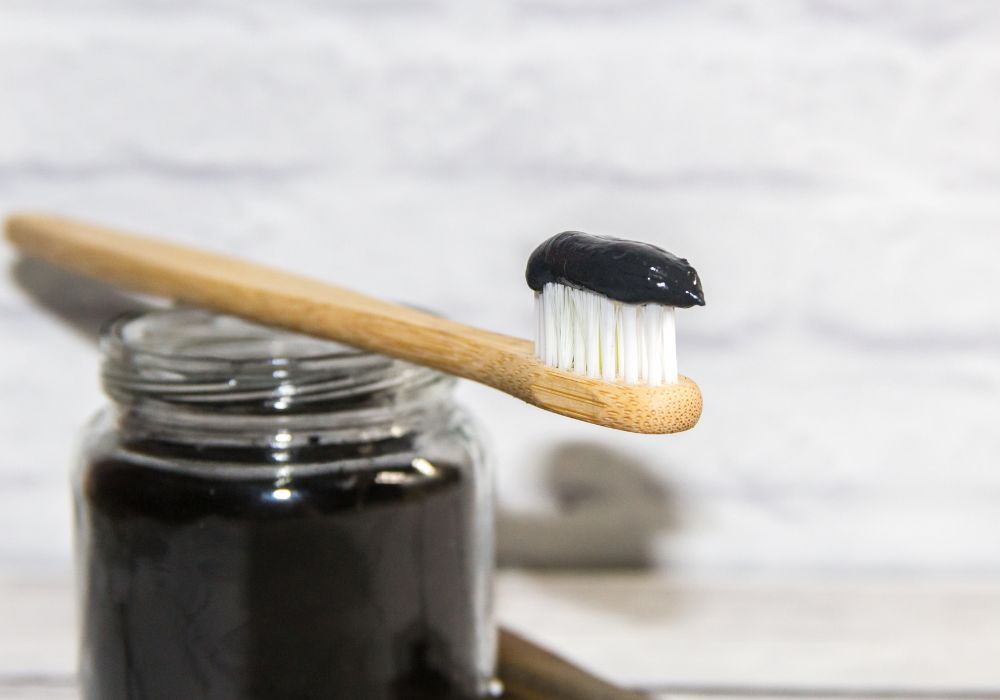
Remineralization is the natural process of restoring minerals like calcium, phosphate, and fluoride back into partially demineralized enamel to reverse early caries progression. This depends critically on the availability of minerals and fluoride. Does charcoal play a role?
Charcoal lacks fluoride
Most charcoal toothpastes and powders do not contain added fluoride like regular toothpastes. Fluoride is the most important factor promoting remineralization back into weakened enamel and preventing further caries development. The mechanisms include:
- Fluoride concentrates in plaque and saliva providing a constant source of free fluoride ions at the tooth surface.
- Fluoride gets incorporated into forming enamel crystals during remineralization, making them more acid resistant.
- Fluoride speeds up calcification by attracting calcium ions.
- Fluorapatite crystals formed in remineralized enamel are more stable and less soluble than hydroxyapatite alone.
- Fluoride inhibits demineralization and bacterial glycolysis and metabolism.
Charcoal may reduce available minerals
Studies suggest charcoal may adsorb and lower free calcium concentrations in saliva. This can reduce the building blocks available for remineralization.
One study found higher enamel fluoride uptake in participants using fluoridated toothpaste compared to those using a fluoride-free charcoal dentifrice after consuming fluoridated water. Charcoal appeared to hinder fluoride incorporation.
Charcoal alone does not remineralize
There is no evidence charcoal can actively mediate enamel remineralization and reversal of white spot lesions or early caries without fluoride.
While it may mildly disrupt plaque acids, charcoal itself does not fill mineral loss areas or undergo integrate into enamel crystals like fluoride. Overall, charcoal is likely inferior to fluoride for strengthening enamel against acid challenges.
Does charcoal powder or toothpaste prevent cavities?
There are currently no clinical studies examining the anti-caries effects of charcoal specifically. Can charcoal toothpastes or powders reduce cavities compared to regular fluoride toothpaste?
No evidence charcoal prevents caries
Despite claims about absorbing toxins, no research has specifically looked at charcoal for preventing or arresting tooth decay in humans. The ADA has not approved any charcoal products as an effective anti-caries agent.
Some studies have reported benefits like lowered oral bacteria or reduced gingivitis with short-term charcoal use. However, these marginal improvements do not necessarily translate to reduced rates of tooth cavities, especially with prolonged use.
Long-term clinical trials tracking cavity progression are needed to determine if charcoal offers any decay prevention benefits. Currently, evidence is lacking to show it prevents caries better than standard brushing without charcoal.
Charcoal likely inferior to fluoride toothpaste
While charcoal may provide some cleaning benefits, it notably lacks fluoride which is proven to actively prevent mineral loss from enamel. The latest guidelines support fluoride toothpastes as the top anti-caries agent:
- Systematic reviews suggest fluoride toothpaste reduces caries increment 10-20% over non-fluoride pastes.
- Fluoride concentrations of 1000-1500 ppm are optimal for preventing and arresting coronal caries.
- Brushing twice daily with fluoride toothpaste is proven to reduce caries risk compared to once daily use.
Given the lack of fluoride and clinical data, charcoal toothpastes are likely inferior to regular fluoride pastes for preventing cavities long-term. More research is needed comparing anti-caries effects head-to-head.
Natural charcoal vs activated charcoal
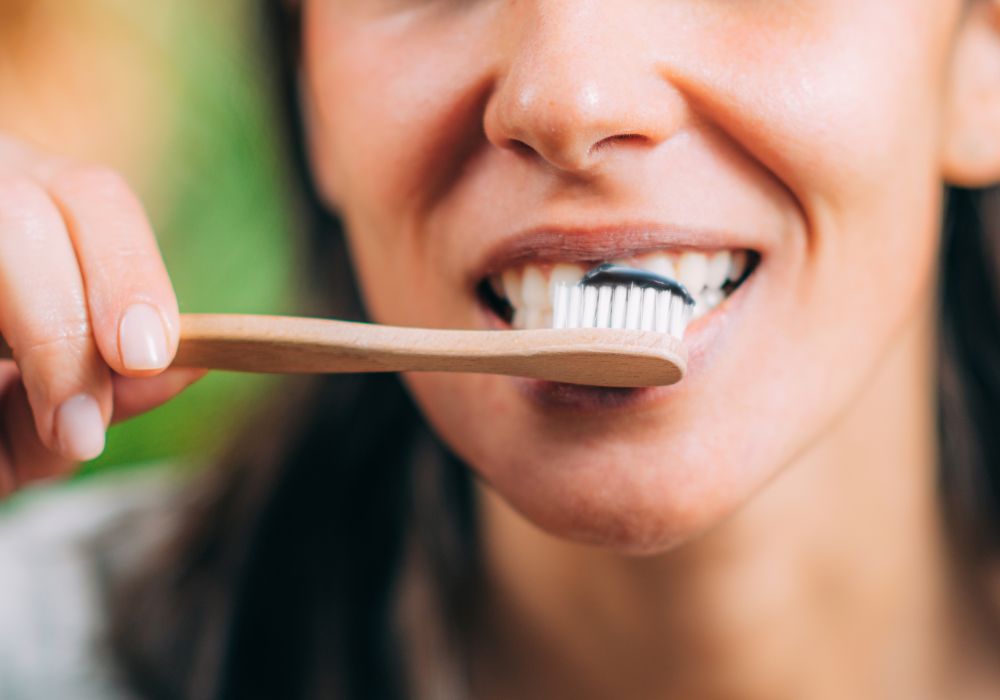
Not all charcoal possess the same properties. Natural charcoal and activated charcoal differ substantially in their production methods and adsorption capacities:
Natural charcoal - Created by burning carbon-rich organic materials like wood, nutshells, or peat at 400-600°C without oxygen. Has some porosity.
Activated charcoal - Heated again to over 900°C in the presence of gases like air, CO2, or steam. This increases porosity and surface area dramatically.
Properties
| Type | Surface area | Pore volume | Particle size | Adsorption potential |
|---|---|---|---|---|
| Natural charcoal | 50-200 m2/g | 0.1-0.3 cm3/g | Variable, larger | Lower |
| Activated charcoal | 500-2000 m2/g | 0.3-1.0 cm3/g | Smaller, uniform | Higher |
Conclusion: Activated charcoal possesses higher adsorption capacity and is preferred for medical and dental applications. Natural charcoal is more variable with poorer adsorption effects.
Potential risks and side effects using charcoal on teeth
While charcoal may offer some benefits, it also poses some risks and side effects:
Abrasiveness
- Charcoal particles are highly abrasive, especially natural charcoal. This can damage the enamel surface and root dentin.
- Overuse promotes tooth sensitivity and gingival recession. Enamel does not regenerate if worn away.
Aesthetics
- Charcoal tooth preparations can stain teeth, gums, and dental work black. Staining may be difficult to remove fully.
- Charcoal abrasion can permanently dull and darken enamel. Its polishing effect is transient.
Safety concerns
- Risk of inhaling fine charcoal powder, especially in children. This can obstruct airways.
- Charcoal may adsorb medications or dietary nutrients if taken concurrently, reducing their efficacy.
- For oral use, the quality and purity of charcoal requires tighter regulation and standardization for medical grade applications. Metal contaminants are a concern.
- Rare risks like intestinal obstruction are possible if capsules are swallowed.
Due to these concerns, some dental organizations recommend caution with using charcoal frequently or excessively without professional guidance.
Balancing the pros and cons of charcoal toothpaste
Based on the available research, charcoal toothpaste may offer some benefits but also has limitations compared to regular fluoride toothpaste:
Potential pros:
- May provide some additional cleaning, abrasive polishing, and temporary whitening benefits above just brushing with a regular toothpaste
- Charcoal adsorption can help reduce bad breath by binding sulfur compounds and oral bacteria involved in odor
- Activated charcoal may adsorb toxins like BPA from dental sealants that leech into saliva
Potential cons:
- Lack of fluoride means no active prevention against demineralization or promotion of remineralization into enamel
- Excessive abrasion can damage enamel and increase sensitivity, especially with natural charcoal
- Mineral adsorption may interfere with enamel remineralization by binding calcium and phosphate
- Saliva likely reduces adsorption capacity for bacteria versus lab conditions
- Not extensively studied for safety and purity/quality standards
Recommendations:
- Use activated charcoal instead of natural charcoal for maximal adsorption
- Limit use to 1-2 times per week at most to avoid excessive wear given abrasiveness
- Apply only light pressure when brushing to minimize enamel scratching
- Don’t substitute for daily fluoride toothpaste which strengthens enamel against acid attacks
- Rinse out charcoal thoroughly after brushing to minimize retained abrasive particles
- Consult your dentist before frequent use if you have dental sensitivity or other oral conditions
For occasional use, charcoal toothpaste can provide some aesthetic whitening and supplemental cleaning. But for optimal decay protection and enamel remineralization, regular fluoride toothpaste remains the top choice.
Natural dietary approaches to improve oral health
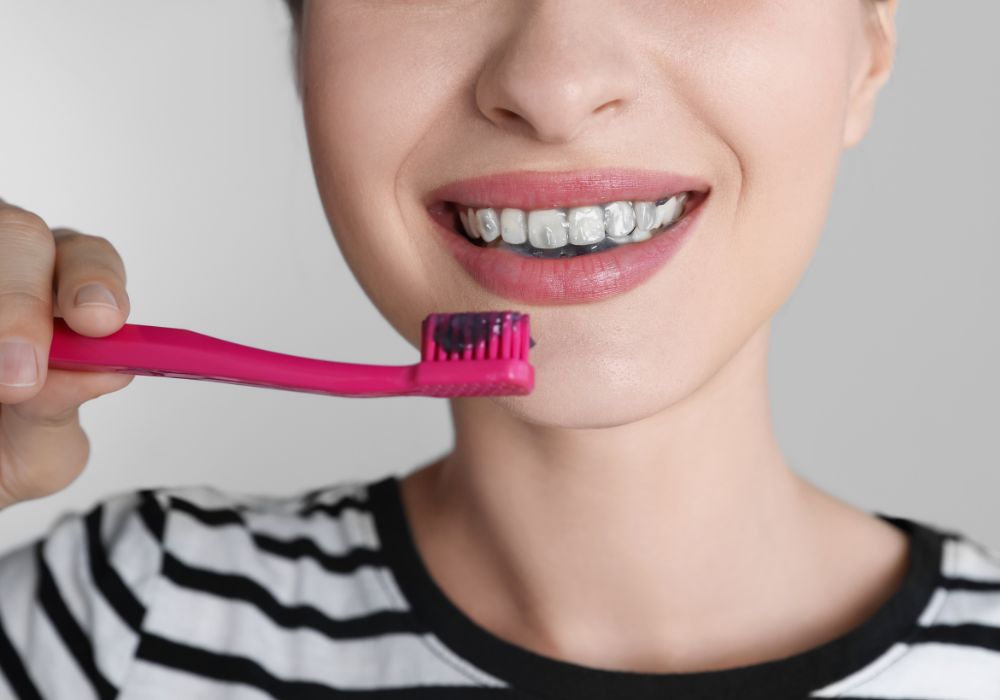
Along with oral hygiene practices, making certain dietary modifications can also help reduce the risk of cavities forming:
Increase intake of:
- Fiber-rich fruits and vegetables - Fibrous foods like apples, carrots, celery, and broccoli help mechanically clean the teeth. They also contain antioxidants that reduce inflammation and high water content helps dilute sugars.
- Milk and dairy products - Milk, cheese, and yogurt are rich in calcium, phosphate, and protein important for rebuilding enamel. They neutralize plaque acids and stimulate saliva flow.
- Sugar-free gum - Chewing gum increases saliva production to help clear food debris and neutralize plaque acids. Look for gum containing xylitol which inhibits bacterial metabolism.
- Fluoridated water - Drinking fluoridated water provides a regular source of fluoride to protect teeth and aid remineralization. If local water is not fluoridated, fluoride rinses can supplement.
- Lean proteins - Meat, poultry, fish, eggs, beans, and nuts help balance the oral microbiome and contain phosphorus.
Limit intake of:
- Sugary beverages - Soda, fruit juices, sports and energy drinks bathe the teeth in concentrated sugars and acids. Avoid frequent and prolonged sipping of these. Drink them along with meals rather than between meals when possible.
- Hard, chewy, sticky candies - Sweets like caramels, gummies, and taffies cling to teeth, allowing prolonged acid attacks on enamel. Sticky textures also dislodge dental fillings.
- Simple refined carbohydrates - Cookies, cakes, muffins, and chips break down rapidly into sugars that feed acid-producing bacteria.
- Acidic foods - Citrus fruits, berries, pickles, vinegar and carbonated drinks lower oral pH. Consume them as part of a meal and rinse with neutral water after.
Making smart dietary choices builds a healthy oral environment resistant to caries development. A hydrating, fiber-rich diet limits sugar available to cariogenic bacteria.
Conclusion
Current research on charcoal toothpastes indicates they may provide some benefits for cleaning and temporary whitening but are likely not a substitute for fluoride toothpaste in protecting against tooth decay. While charcoal can adsorb toxins and some bacteria in lab studies, there is little clinical evidence this reduces cavities significantly better than regular brushing without charcoal over the long term.
The lack of fluoride in charcoal dentifrices remains a concern, as it allows demineralization of enamel without promoting effective remineralization. Based on available data, the ADA has not endorsed charcoal pastes for caries prevention. More human trials directly comparing charcoal to fluoride toothpastes are still needed to determine if charcoal offers any anti-caries advantage.
For reducing staining or mild polishing benefits, occasional use of charcoal paste 1-2 times per week may be beneficial. However, risks like abrasion, loss of enamel, and tooth sensitivity can occur with overuse. Your best defense against tooth decay still centers around twice daily brushing with fluoride toothpaste along with flossing and dietary adjustments to limit fermentable sugars. Talk to your dentist to decide if adding supplementary charcoal may be helpful for your individual oral health needs.
Frequently Asked Questions
1. Can charcoal toothpaste heal cavities or remineralize teeth?
No, there is no evidence that charcoal toothpaste alone can actively heal cavities or effectively remineralize enamel. Remineralization requires bioavailable minerals like fluoride, calcium, and phosphate. The lack of added fluoride in most charcoal pastes limits remineralization ability compared to regular fluoride toothpaste.
2. Is it safe to swallow charcoal toothpaste?
It’s best to minimize swallowing charcoal toothpaste, as large amounts could potentially cause intestinal obstruction or absorb nutrients and medication. That said, occasional small ingestion while brushing is unlikely to cause problems. The biggest concern with swallowing charcoal is for young children. Always supervise them using charcoal products and teach them to spit it out rather than swallow.
3. Can charcoal toothpaste damage teeth or gums?
Yes, excessive use of charcoal toothpaste can potentially erode enamel and dentin over time. Charcoal is abrasive, so heavy scrubbing or using it more than 1-2 times per week is not recommended. It may cause gum recession as well with overly vigorous brushing. Apply with gentle pressure focused on the teeth rather than gums.
4. Should I use charcoal toothpaste daily?
No, charcoal toothpaste is too abrasive for twice daily use and provides no fluoride. Use charcoal no more than 1-2 times per week at most. Daily brushing is still essential using a standard fluoride toothpaste to strengthen enamel against acid attacks and promote remineralization. Charcoal can supplement occasional use but should not replace regular fluoride toothpaste.
5. Does charcoal toothpaste whiten teeth permanently or temporarily?
Charcoal likely only temporarily whitens and brightens teeth through abrasive polishing and stain removal. There is no lasting bleaching effect on enamel, and stains will return over time without repeated use. The fine charcoal particles help buff off some surface discoloration but permanent whitening requires peroxide bleaching under dental supervision. Always consult your dentist if seeking significant tooth whitening.

